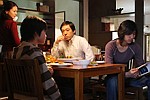 Shadows off the beaten path
Shadows off the beaten pathMESRINE: PUBLIC ENEMY NO 1 | THREE KINGDOMS | TOKYO SONATA
< < F O R E I G N > >
last update 21.Jun.09
See also: SHADOWS FILM FESTIVAL
 R E V I E W B Y R I C H C L I N E
R E V I E W B Y R I C H C L I N E L’Instinct de Mort
L’Instinct de Mort
scr Abdel Raouf Dafri
with Vincent Cassel, Cécile De France, Gérard Depardieu, Gilles Lellouche, Roy Dupuis, Elena Anaya, Michel Duchaussoy, Myriam Boyer, Florence Thomassin, Abdelhafid Metalsi, Gilbert Sicotte, Deano Clavet

release Fr 22.Oct.08,
UK 7.Aug.09,
US 27.Aug.10
08/France Pathe 1h53
TORONTO FILM FEST

 Edgy and rough, this is the first half of an energetic biopic about one of France's most notorious criminals. And with a riveting performance by Cassel at the centre, it's definitely worth seeing, even if it never really gets beneath the skin.
Edgy and rough, this is the first half of an energetic biopic about one of France's most notorious criminals. And with a riveting performance by Cassel at the centre, it's definitely worth seeing, even if it never really gets beneath the skin.
Jacques Mesrine (Cassel) is educated in brutality while serving as a soldier in Algeria. With his charismatic personality, he falls into a life of crime with the vicious mobster Guido (Depardieu). While fiercely protective of his Spanish wife Sofia (Anaya), he engages in nasty acts of vengeance and, after a stint in prison in 1962, finds a new wife Jeanne (DeFrance). They embark on a Bonnie & Clyde-style crime spree, travelling from Montreal to Arizona with the officials on their tail. But the Canadian prison can't hold him either.
Filmmaker Richet races through this story so quickly that we rarely get any sense of the situations or the characters. This is bold, confident, sexy filmmaking, but it feels like it bounces across the surface of this man's life. Along the way, Richet captures the 1960s in vivid detail (including some groovy split-screen imagery) and includes some truly audacious sequences that keep us on the edge of our seats. But as a whole, it feels oddly episodic.

See also Shadows'
INTERVIEW WITH
VINCENT CASSEL
The frantic pace doesn't help either, as the film leaps from scene to scene without much connective tissue. We struggle to keep up with the stream of characters and events. But each lively, action-packed, harrowing or emotional scene is wonderfully staged and performed, with superb moments featuring Cassel as well as the always watchable DeFrance and Depardieu on peak form in gruff tough-guy mode. Next up: the '70s...
11.May.09
 R E V I E W B Y R I C H C L I N E
R E V I E W B Y R I C H C L I N E L’Ennemi Public No 1
L’Ennemi Public No 1
scr Abdel Raouf Dafri
with Vincent Cassel, Ludivine Sagnier, Mathieu Amalric, Gérard Lanvin, Samuel Le Bihan, Olivier Gourmet, Michel Duchaussoy, Myriam Boyer, Anne Consigny, Georges Wilson, Alain Fromager, Alain Doutey
 release Fr 19.Nov.08,
release Fr 19.Nov.08, UK 28.Aug.09,
US 3.Sep.10
08/France Pathe 2h10

 Picking up where Killer Instinct left off, this second part of the biopic has a 1970s style, with grittier edges and darker violence. But it takes the same anecdotal approach, never quite letting us in.
Picking up where Killer Instinct left off, this second part of the biopic has a 1970s style, with grittier edges and darker violence. But it takes the same anecdotal approach, never quite letting us in.
In 1973, rampant criminal Jacques Mesrine (Cassel) has finally been captured by the cops but stages a daring courtroom escape with the help of his pal Charlie (Lanvin). He's soon back to his bank-robbing, executive-kidnapping ways, taunting the tenacious detective Broussard (Gourmet) even when he's arrested. In prison he concocts an elaborate escape with fellow inmate Besse (Amalric), and the two go on another brazen crime-spree, meeting Mesrine's next wife Sylvie (Sagnier) along the way. But as Mesrine adopts the politics of Germany's Baader-Meinhof gang, the cops are closing in.
Once again, the film's outrageous stylishness keeps us watching, as Richet recreates the period with a remarkable attention to detail, using coarse touches to ground the chaotic shootouts and heists in reality. This film has the same snappy pace, leaping through the story and only giving us brief insight into the characters as it creates each set piece. But what set pieces they are!
Every sequence snaps with inventive energy, and the robberies, kidnappings and escapes are all utterly riveting in their outrageousness (Cassel insists they toned things down because the reality was too incredible). This half of the story actually stretches Cassel more, as Mesrine is paunchy and a bit crazed, always wearing ludicrous disguises and drifting deep into philosophy. This adds to his charismatic mystique, although it doesn't make him any more sympathetic.
The film is framed with Mesrine's death, which plays out in thrilling detail. Like other scenes, it's a seriously brutal sequence of events, rendered by Richet on a big scale but also anchored in earthy authenticity. The standout supporting role this time belongs to the remarkable Amalric as a character who deserves his own film. And Sagnier is terrific as always. But they're only in orbit around Cassel as a man who saw himself as a Robin Hood figure, except that he kept all the money. "At least I can say I didn't waste my life," he says. Some of us might beg to differ.
13.May.09
 R E V I E W B Y R I C H C L I N E
R E V I E W B Y R I C H C L I N E
scr Daniel Lee, Ho Leung Lau
with Andy Lau, Sammo Hung, Maggie Q, Vanessa Wu, Andy On, Yueh Hua, Ti Lun, Chen Zhi Hui, Pu Quan Xin, Yu Rongguang, Damian Lau, Timmy Hung
 release Chn 3.Apr.08,
release Chn 3.Apr.08, UK 13.Jul.09 dvd
08/China 1h42
 Based on the same historical events as John Woo's RED CLIFF, this is more a Chinese war drama than blockbuster entertainment. It covers a darker series of events and is a bit more difficult to engage with.
Based on the same historical events as John Woo's RED CLIFF, this is more a Chinese war drama than blockbuster entertainment. It covers a darker series of events and is a bit more difficult to engage with.
In AD 190, an intelligent warrior Zhao Zilong (Andy Lau) rises to prominence in the kingdom of Emperor Liu (Yueh). Dreaming of uniting the three kingdoms in peace, Zilong leads Liu's army into battle against the evil Cao Cao (Damian Lau), with generals Guan Yu (Ti) and Zhang Fei (Chen) at his side. But after 20 years, Zilong is the only general standing, and with his old friend Pingan (Sammo Hung), he has one last battle left: facing off against Cao Cao's scheming granddaughter (Maggie Q).
Made on a grand scale, the film has an intriguingly dark and gritty look to it, with expanses of dusty desert landscapes and a nation in turmoil. And the warriors all look like they've been at it for years--filthy, bedraggled and very realistic. But while there are moments of brilliance in the fight choreography, director Lee chooses to shoot the action scenes mainly in close-up, then use heavy editing and visual effects to put them together. The resulting scenes look fascinating, but are impossible to follow in any meaningful way.
Fortunately, at the centre there's a strongly emotional story as Zilong begins to question whether it's possible to ever achieve peace through war. After spending his life on the battlefield, unity seems just as far off. "What have we been fighting for over all these years?" he asks. And it's this introspective undercurrent that makes the film worth seeing, because otherwise it's a bit of a struggle.
The oddest thing about the film is the way everyone talks incessantly about strategy--war as a chess game--and then they still just indulge in mass-scale carnage. And there's also frequent maniacal laughing and screaming battle cries as these men indulge in macho sloganeering and emotional speeches. These moments are rather camp, but are played dead straight. And then Maggie Q flounces in like a tranny diva. All of this livens up an already fascinating story, but you get the feeling it's not meant quite that way.
3.Jun.09
 R E V I E W B Y R I C H C L I N E
R E V I E W B Y R I C H C L I N E MUST
MUST  SEE
SEE
scr Max Mannix, Kiyoshi Kurosawa, Sachiko Tanaka
with Teruyuki Kagawa, Kyoko Koizumi, Yu Koyanagi, Kai Inowaki, Haruka Igawa, Kanji Tsuda, Kazuya Kojima, Koji Yakusho, Jason Gray
 release Jap 27.Sep.08,
release Jap 27.Sep.08, UK 30.Jan.09,
US 13.Mar.09
08/Japan Fortissimo 1h59
CANNES FILM FEST
TORONTO FILM FEST
 Starting out like a gentle family melodrama, this gorgeously made Japanese film morphs into something much darker as it progresses. And in both its economic premise and family observations, it couldn't be any timelier.
Starting out like a gentle family melodrama, this gorgeously made Japanese film morphs into something much darker as it progresses. And in both its economic premise and family observations, it couldn't be any timelier.
Ryuhei (Kagawa) manages a busy office and is so stunned when he's made redundant that he doesn't tell his wife Megumi (Koizumi). He pretends to go to work every day, hanging out near a homeless centre with an unemployed friend (Tsuda). Meanwhile, Megumi is battling her own inner demons, wishing her life wasn't so dull. And their sons have problems too: teen Takashi (Koyanagi) decides to join the US military in Iraq, while preteen Kenji (Inowaki) spends his lunch money on piano lessons, discovering that he's a prodigy.
Kurosawa opens with an Ozu-style shot of domestic tranquillity before unpeeling everything down to bare bone. It becomes a kind of kitchen sink horror film, as each character is pushed to the brink emotionally and physically. And what makes this film remarkable is the fact that they all travel this path on their own, too proud or afraid to reach out for any help, right to the achingly beautiful finale. This biting comment on modern society (not just Japan's) is thoroughly unnerving.
The cast members give strong, transparent performances that highlight hidden emotions. Even as the plot spirals into overwrought scenes of emotion, pain and fear, the film remains stately and cool. This matter-of-fact approach cleverly shows everyday situations warping into something extraordinary. Dreams of an unruffled, happy life vanish in a moment. Ryuhei wants just a shred of dignity, Megumi wishes she could wake up and be someone else, Kenji wants to do what he knows he should do, Takashi wants to control his destiny.
As everything is stripped away, each of them must find the strength to move forward. All of these things happen in beautifully staged scenes that resonate deeply. We know exactly what it's like to try to maintain some privacy and independence by hiding our true feelings. We also know that people are rather eerily more observant than we think they are. We can't hide as well as we'd like to. And in the end, we need each other to help put things back together.
20.Jun.09


See also: SHADOWS FILM FESTIVAL
© 2009 by Rich Cline, Shadows
on the Wall